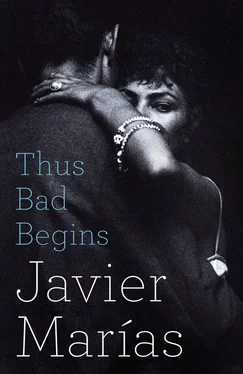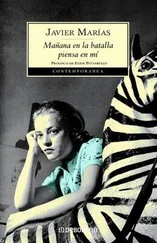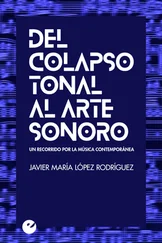However, something strange happened: the social pact became so internalized that we ended up fulfilling the condition almost too scrupulously, especially when it came to talking about the past. It made good sense for us not to get embroiled with the courts and for the courts not to get clogged up with painful lawsuits that would have made it impossible for us to continue living together and would have ended very badly. Preferring not to know and not to talk about it was another matter entirely. And yet most people chose that route, chose to remain silent, certainly in public, but often in private too. There was still a degree of stoicism and discretion then, this was before the times — which continue to this day — in which everyone saw the advantages of playing the victim and bemoaning and profiting from their personal woes, whether real or imaginary, or those of their antecedents of class or gender, ideology or region. There was a certain sense of elegance that advised against boasting about suffering and persecution, and made those most badly affected hold their tongues. This attitude only changed when a few notable individuals who had supported Franco at some point — either at the beginning, when repression was at its fiercest, or in the middle or at the end — pushed their luck and, not content with their state of impunity, which meant that they could live in peace and unreproached and with the privileges from their past careers intact, began elaborating illusory biographies, pretending that they had been democrats since the Athenian age and claiming that their anti- franquista attitudes dated back a long way, if not for ever. They took shelter in the ignorance of the younger citizens — and in the ignorance of the population as a whole — and in the discretion of those of their own age, who knew better. One novelist stated in a newspaper that, when the Civil War broke out, he was in Galicia, a franquista stronghold, and so had no alternative but to fight on their side, but that had he been in Madrid, he would have ardently defended the Republic, as had been his intention at the time. Those who knew him also knew that he had, in fact, been in Madrid at the start of the War, and had done all he could to escape from there and travel to Galicia to join the very side he was now renouncing with such aplomb. A historian boasted of his ‘years of exile in Paris’, when he had, in fact, spent those years working in the Spanish embassy, representing Franco, of course. Another intellectual mentioned his ‘enforced exile’, which had consisted of a lucrative two-year contract with an American university in the comparatively peaceful 1960s — a time when no one who had survived the worst bothered going into exile — having benefited in previous harsher years from the numerous favours bestowed on him by the regime for being a fellow Falangist and adoring supporter. And there were many more such cases.
These false declarations and denials, these inventions and presumptions, proved irritating to anyone who had genuinely opposed the regime or refused to collaborate, who had suffered for decades and had a pretty fair idea of the role played by various individuals; irritating, that is, to the few people who had the necessary knowledge and memory and so could not be deceived. Most could be and were deceived, because no letters were sent to the press or to the television stations contradicting these pompous asses who, instead of counting themselves lucky to have survived unscathed following the restoration of democracy, had absolutely no compunction about concocting these stories, presenting themselves with non-existent medals, and generally manufacturing a convenient pedigree. The people who knew the truth were accustomed to losing and to keeping quiet. The agreement, the pact of silence, weighed on them excessively, as did the general distaste for and aversion to revenge and betrayal. And so the lies of these former Franco supporters went unchallenged and no one spoke of their personal experiences in public, apart from the brazen few and their fallacious tales. However, the brazen few grew still bolder and went so far with their barefaced lies that they gradually provoked more and more of those in the know to react in private — how much restraint and patience they showed, how much they continue to show now — and to talk about what they knew, what they had done or said or written, how they had behaved during the War and during the dictatorship, behaviour that thousands or even hundreds of thousands of people were now taking great pains to hide, embellish or erase. There were so many backing each other up that the great labour of concealment and disguise was sure to succeed: I’ll stand by you if you stand by me, I’ll keep schtum for you if you keep schtum for me, I’ll put a flattering gloss on your past if you do the same for me. And I thought that perhaps it was some such murmur, from those resisting the sham and telling the truth — toned down, discreet, mentioned only to family members or at meetings and suppers with friends or in the even greater privacy of bed — that had recently reached Muriel’s ears.
While I was submitting him to my brief interrogation, Muriel had continued his pacing, every now and then glancing across at me, merely to check that I was still there, still listening, glances that led me to think that he hadn’t grasped what I was getting at. He stopped when I stopped talking. Then he gave me a grave, sober look, which I didn’t know how to interpret. Perhaps it bothered him to be asked so many direct questions, which might force him to tell me the story when he had not yet decided whether to tell me or not. He put away the pillbox-cum-compass and with his free hand fumbled for his tie underneath his sweater and smoothed it out — it must have got wrinkled or ridden up while he was lying on the floor. He also straightened the knot, although, having no mirror handy, it remained crooked. I pointed this out to him, gesturing with my left hand, and he again adjusted the knot, this time successfully. He went over to one of the sofas, sat down, crossed his legs and said:
‘Almost everything has to do with the War, Juan, one way or another. Let’s just hope that one day this will cease to be the case, but I fear I won’t see that day. I doubt if even you will, despite being so much younger and even though what happened then must seem as remote to you as the Cuban or the Carlist wars or even the Napoleonic invasion. If that’s what you believe, then you’re quite wrong. You’ll continue to hear people talking about our dreadful War for far longer than you might think. Especially those who didn’t live through it, because they’re the ones who need it most, in order to give meaning to their existence, to feel anger or pity, to have a mission in life, to feel they belong to the right side, to seek retrospective or abstract vengeance, what they would call justice when there can be no posthumous justice; to be moved and to move others to tears, to write books or make films and earn money, to gain prestige, to benefit sentimentally from the poor wretches who died, to imagine hardships and sufferings no one could possibly understand even if they heard about them first-hand; to set themselves up as their heirs. A war like that is a stigma that takes one or even two centuries to disappear, because it contains everything and affects and debases everything. It contains the very worst of everything. It was like removing the mask of civilization that all presentable nations wear, firmly attached like this patch’ — and he tapped his own eyepatch — ‘and which allows them to pretend. Pretending is essential if we are to live together, to prosper and progress, and here, where we’ve seen the criminals’ true faces, seen what happened, pretence is impossible. It will take a very long time for us to forget what we are or what we could be, and how easily too, all it takes is a single match. There will be times when that war dwindles in importance, as is beginning to happen now, but it will be like one of those family feuds that last for generations, and you find the great-great-great-grandchildren of one family hating the great-great-great-grandchildren of another family even though they have no idea why; simply because that hatred was drummed into them from birth, enough for those two lots of great-great-great-grandchildren to have inflicted harm on each other and thus see in their respective actions proof of what they were told: “Our elders warned us about them, and they were quite right.” And so it goes on. None of us can possibly comprehend the harm done by Franco and his henchmen, by those who began that entirely unnecessary War, with such deliberate, extreme intent, as an exercise in extermination, and who enjoyed it all so much that they didn’t want it ever to end. Of course those they attacked were equally extreme. But it isn’t just what they did, it’s the curse they placed on this country. And, unlike Hitler, the great oafs weren’t even aware of that curse. They didn’t consider the consequences, why would they? And, on the other hand, on the other hand, who can say how much longer those will last …’ Muriel stopped speaking and remained sunk in thought, again looking up, perhaps at the painting by Casanova’s brother. But it was as if his one eye were contemplating not the horseman in the picture (possibly a scene depicting peaceful military manoeuvres, if that isn’t a contradiction in terms), but a very slow, almost motionless, future of imperceptible advances and retreats. That is precisely the effect produced by the best paintings, which, despite everything, never move, going neither forward nor back.
Читать дальше












